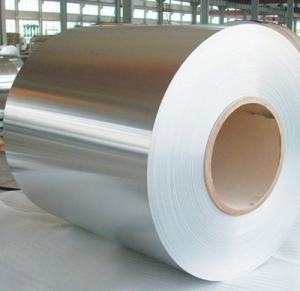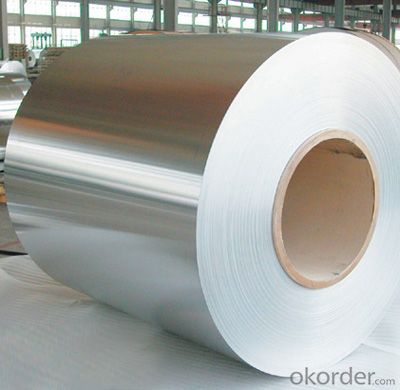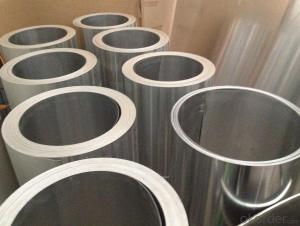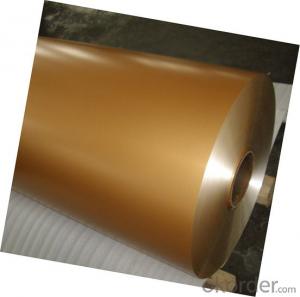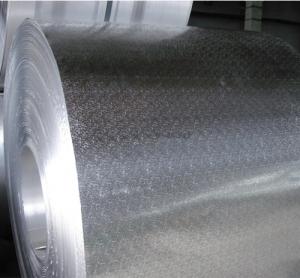Stucco Embossed Mill Finished Aluminum Coils and Sheets from China
- Loading Port:
- Shanghai
- Payment Terms:
- TT or LC
- Min Order Qty:
- 5 m.t.
- Supply Capability:
- 9000 m.t./month
OKorder Service Pledge
OKorder Financial Service
You Might Also Like
1.Structure of Aluminum Sheet with PE Film :
Mill Finished Aluminum Coil is designed for many field such as electronics, instruments, lighting decoration, packing industry, and house decoration, curtain wall, honeycomb-core panel, sandwich panel, aluminum composite panel, aluminum composite pipe etc.. Mill finished aluminum coil for is hard and everlasting under the blazing sun. You can choose the alloys as your habitation and we will do our best to meet your requests.
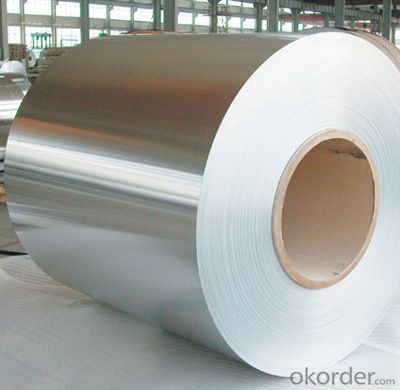
2.Main Features of the Aluminum Sheet with PE Film :
• Smooth surface
• High manufacturing accuracy
• High strength of extension and yield
• Well packaged
• No marks, no scratch, no excessive oil
3. Aluminum Sheet with PE Film
| Alloy: | AA1050, 1060, 1070, 1100, 3003, 3004, 3005, 3105, 5052, 5083, 5754, 8011, 8006 |
| Temper: | H14, H16, H18, H22, H24, H26, H32, O/F |
| Thickness: | 0.2-100mm |
| Width: | 30mm-1700mm |
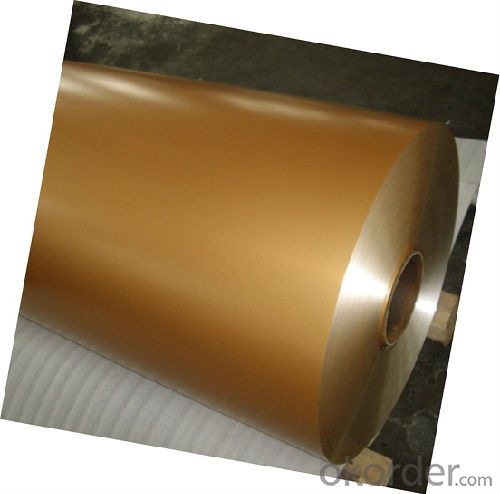
4.FAQ
We have organized several common questions for our clients,may help you sincerely:
① How about your company?
A world class manufacturer & supplier of aluminum coil and alloy blanks. Aluminum production base is comprised of 18 aluminum annealers, 10 coil and foil mills, 4 continuous production lines, 2 hot rolling production line and 3 prepainted lines.
Export 5000 tons per month to Asia, America and Middle East. Always do the best for our clients.
②Can you guarantee the quality of the products?
We are responsible for the quality of materials to get a long-term cooperation with clients in a reasonable period of time and we are glad to arrange and coordinate any third party inspection for you.
③What is the delivery time after purchase?
35 day after receiving client’s deposit or correct LC
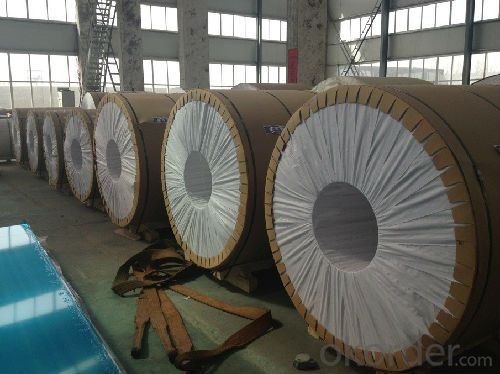
- Q: Can aluminum coils be used in electrical transformers?
- Electrical transformers can indeed utilize aluminum coils. Although copper is typically the preferred material for transformer windings, there has been a growing trend towards utilizing aluminum due to its cost-effectiveness and lighter weight. Distribution transformers, which are smaller in size and operate at lower voltages, often employ aluminum coils. However, it is important to consider certain factors when using aluminum coils in transformers. Aluminum has a lower conductivity than copper, necessitating larger cross-sectional areas for the aluminum coils to compensate for this difference. Furthermore, aluminum has a higher coefficient of thermal expansion compared to copper, requiring proper precautions to accommodate the differential thermal expansion between the aluminum windings and other transformer components. In conclusion, aluminum coils can be suitable for specific transformer applications, but it is crucial to meticulously execute the design and manufacturing process to ensure optimal performance and reliability.
- Q: How do you store aluminum coils to prevent damage?
- To prevent damage to aluminum coils, it is best to store them in a dry and well-ventilated area, away from direct sunlight and moisture. Storing them horizontally on a clean and flat surface, while using proper supports or holders to prevent rolling or bending, will also help maintain their integrity. Additionally, ensuring that the storage area is free from any sharp objects or potentially corrosive materials will further safeguard the aluminum coils from damage.
- Q: I live in blue ridge ga and have about 2,000 aluminum cans and would like to know how much I can get for them.
- The price for scrap aluminum cans varies litteraly every day. Within the last year, it has been between about 28 cents and 50 cents a pound. The last price I saw for clean, flattened cans delivered to the dealer was about 42 cents. As I said, it could be a bit higher or lower than that now. There are about 30-32 cans per pound of aluminum, so your 2,000 cans probably weigh around 64 pounds and could be worth about $27, assuming there has been no big change in the price recently. But that's a delivered price. If you have to drive 10 miles each way and your truck gets 20 mpg, you will be paying for a gallon of gas. If it is 30 miles each way (60 miles total), you are looking at 3 gallons of gas, which is probably about $8, leaving you a profit of around $19, or maybe a little less. That's with some optimistic assumptions, and it doesn't include the cost of big plastic bags to carry the cans. Not very encouraging, is it? Recycling makes sense for a big city or a recycling center, where they can get thousands of cans a day. But it is hard for an individual to make any money at it. i know this is not what you wanted to hear, but I hope it is helpful anyway.
- Q: What are the potential risks of using aluminum coils in specific applications?
- There are several potential risks associated with using aluminum coils in specific applications. Firstly, aluminum is a highly reactive metal and can undergo oxidation, leading to the formation of aluminum oxide. This oxide layer can be protective in some cases, but in certain environments, such as acidic or alkaline conditions, it can break down and result in corrosion of the aluminum coils. This corrosion can compromise the structural integrity of the coils and reduce their lifespan. Secondly, aluminum coils have relatively low strength compared to other metals, such as steel. This can make them susceptible to deformation or damage under heavy loads or high pressure conditions. In applications where the coils are exposed to significant mechanical stress, they may be more prone to bending or cracking, leading to potential failure. Furthermore, aluminum has a relatively low melting point compared to other metals, such as copper or iron. This means that in applications where the coils are subjected to high temperatures, such as in heating or cooling systems, there is a risk of the aluminum coils melting or deforming. This can result in system malfunctions, reduced efficiency, or even safety hazards. Another potential risk of using aluminum coils is related to their electrical conductivity. While aluminum is a good conductor of electricity, it has a higher resistance compared to copper. This can lead to increased power losses and reduced energy efficiency in electrical applications. Additionally, aluminum coils may also be more prone to electrical arcing or sparking, which can pose a fire hazard. Finally, it is worth mentioning that aluminum is a lightweight metal, which can be advantageous in certain applications. However, this also means that aluminum coils may have lower durability and resistance to physical impacts or external forces compared to heavier metals. In environments where the coils are exposed to vibrations, impacts, or other mechanical stresses, they may be more susceptible to damage or premature failure. Overall, while aluminum coils offer various benefits, including light weight, good thermal conductivity, and resistance to corrosion, it is important to carefully consider the potential risks associated with their use in specific applications. Proper design, maintenance, and compatibility with the operating conditions are crucial to mitigate these risks and ensure the safe and effective performance of aluminum coils.
- Q: Are aluminum coils suitable for interior decorative applications?
- Indeed, interior decorative applications are well-suited for aluminum coils. This material, being lightweight and flexible, lends itself to effortless shaping into diverse forms, thus making it perfect for decorative purposes. Moreover, aluminum offers a vast array of finishes, colors, and patterns, granting limitless design options. In addition, its remarkable durability and corrosion resistance guarantee its enduring aesthetic appeal. Furthermore, aluminum is an environmentally friendly choice, as it can be recycled indefinitely, making it a sustainable material for interior decorations. All in all, aluminum coils offer a cost-effective and visually appealing alternative for interior decorative applications.
- Q: How do you clean and maintain aluminum coils?
- Achieving clean and well-maintained aluminum coils can be accomplished by following a few straightforward steps. Initially, gather the necessary materials such as a soft brush or vacuum cleaner, a mild detergent or coil cleaner, a water hose, and a spray bottle. Commence by deactivating the power supply to the unit and ensuring that it is safe to proceed. Subsequently, employ a soft brush or a vacuum cleaner with a brush attachment to eliminate any debris or loose dirt from the coils. It is crucial to exercise gentleness to prevent harm to the delicate fins of the coils. Upon removal of loose dirt, combine a solution of mild detergent or coil cleaner with water within a spray bottle. Thoroughly spray the solution onto the coils, making certain that it covers the entire surface. Allow the solution to sit for a few minutes to enable it to penetrate the dirt and grime. Once the solution has had sufficient time to work, delicately scrub the coils using a soft brush or a soft cloth. Caution must be exercised to avoid applying excessive pressure or utilizing abrasive materials, as this could result in damage. Particular attention should be given to areas with obstinate dirt or buildup. Following a thorough cleaning of the coils, rinse them off with a water hose. It is crucial to ensure that all the detergent or coil cleaner is completely washed away. It is recommended to direct the water flow in the opposite direction of the air flow in order to prevent the pushing of debris further into the coils. Subsequent to rinsing, allow the coils to completely dry before reactivating the power supply. This will prevent potential electrical hazards. The utilization of a fan or the natural air drying process can be employed. To uphold the cleanliness of the coils, it is advisable to clean them at least once a year or more frequently if the unit is exposed to heavy dirt or debris. Regular inspection of the coils for dirt buildup and prompt cleaning will aid in maintaining efficiency and prolonging the lifespan of the aluminum coils.
- Q: How exactly can you tell (just by looking) that the nipple used to tighten a spoke is brass and not aluminum? I know some are silver - not sure if they are painted silver or what. But without scraping or causing any damage to the nipple, how would one know for sure if they have no experience between the two.p.s. I don't know how heavy or light either is, so if that is one way to tel, it's not a good way for me.
- Commercially pure aluminum has a tensile strength of approximately 90MPa and can be improved to around 180MPa by cold working. Typical Brass alloys have tensile strengths in the range 250 - 500MPa. There maybe different brass materials which exceed this limit. There may be those which are lower in tensile strength than the minimum of this range. Check in the web. But, according to these data, you can see that Brass is stronger than Aluminum. So, the brass plate is stronger than the Al plate. However, Aluminum is a pure metal. Brass is an alloy. So, there maybe different brasses depending on their composition.
- Q: What are the different sizes and dimensions of aluminum coils available?
- The specific industry and application determine the sizes and dimensions of aluminum coils, which can vary. Various widths, thicknesses, and lengths are generally available to cater to different needs. In the construction sector, aluminum coils are typically found in widths ranging from 24 to 60 inches. The thicknesses can vary from 0.019 to 0.040 inches. While the lengths of the coils can differ, standard lengths are usually around 100 feet or more. For industrial and manufacturing purposes, the sizes and dimensions of aluminum coils can be even more diverse. Coils wider than 60 inches are available for large-scale applications. The thicknesses can range from 0.006 inches for slim, lightweight coils to 0.250 inches for heavy-duty applications. Moreover, the dimensions of aluminum coils can be customized to meet specific requirements. Some manufacturers offer coil slitting services to cut coils into narrower widths, while others can provide custom lengths or thicknesses based on customer specifications. It is worth noting that the availability of different sizes and dimensions may vary among suppliers. Therefore, it is advisable to consult a reputable aluminum coil supplier or manufacturer to determine the specific sizes and dimensions they offer.
- Q: Are aluminum coils suitable for marine applications?
- Yes, aluminum coils are suitable for marine applications. Aluminum is a corrosion-resistant material, making it an excellent choice for use in marine environments where exposure to saltwater and other corrosive elements is common. Aluminum coils are lightweight, durable, and have high strength-to-weight ratio, which is important for marine applications where weight reduction is desired. Additionally, aluminum coils can withstand extreme temperatures and have good thermal conductivity, making them suitable for various marine heating and cooling systems. Overall, aluminum coils are a popular choice in marine applications due to their corrosion resistance, durability, and lightweight properties.
- Q: What is the purpose of an aluminum coil and what are its applications?
- <p>An aluminum coil is a versatile material that serves various functions. It is used in numerous applications due to its lightweight, corrosion resistance, and high thermal and electrical conductivity. Common uses include manufacturing heat exchangers, transformers, and electrical wiring. Aluminum coils are also utilized in the construction of automotive parts, aerospace components, and in the packaging industry for cans and foils. Additionally, they are employed in the HVAC industry for air conditioning and heating systems, and in the production of various consumer goods.</p>
Send your message to us
Stucco Embossed Mill Finished Aluminum Coils and Sheets from China
- Loading Port:
- Shanghai
- Payment Terms:
- TT or LC
- Min Order Qty:
- 5 m.t.
- Supply Capability:
- 9000 m.t./month
OKorder Service Pledge
OKorder Financial Service
Similar products
Hot products
Hot Searches
Related keywords
